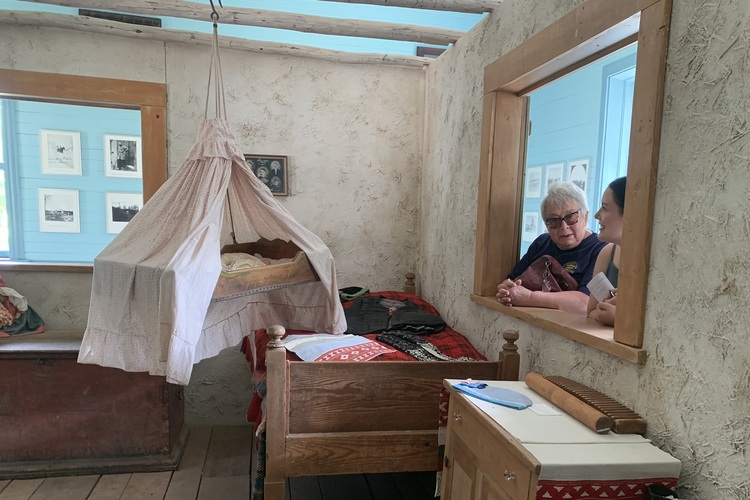Jan 21, 2025 Volunteers have long been seen as the backbone of Saskatchewan. And they do incredible amounts of work to keep the province's heritage alive. The unpaid labour of volunteers is astounding, "with more than 344,000 Saskatchewan individuals contributing an estimated 14 million hours annually, averaging approximately 41 hours per person."[1] A common sentiment amongst many heritage volunteers I spoke with when asked about an estimate on the number of volunteer hours they dedicated to heritage in a year, responded with a chuckle and a "I don't want to think about it." One heritage volunteer I spoke with said that over the last 25 years, he's probably contributed over 25,000 hours to heritage volunteering activities – and that was a low-ball estimate! There are so many different heritage organisations, places, and projects that are solely volunteer run – meaning there are no paid staff to run programming, create educational materials, undertake the daily operations, care for and steward collections, conduct community outreach, help people answer questions, to provide a place for community connection, and to seek out and apply for grants and funding opportunities, among many other duties. The list above only scratches the surface of the heritage volunteer labour that benefits us all. Volunteers often go above and beyond to ensure that the heritage they care about is safeguarded, that community stories are remembered, and that Saskatchewan's heritage is kept alive. But heritage volunteer burnout is real. The expectations are high. The workload is heavy. Fundraising and grant writing is never-ending. Volunteers themselves often run on barebones resources and funding. Throughout my summer research, I spoke to multiple people who volunteered for heritage organisations, places, and projects. Not only that, but many of these people were wearing multiple hats and taking on numerous roles within each place they volunteered for. Many of these heritage volunteers I spoke with love their volunteer work, but these volunteer jobs come with responsibilities, stress, worry, and significant time commitments. When heritage volunteering becomes an obligation or a source of stress, it's no longer enjoyable, and many volunteers either leave or become disillusioned with the impacts of their contributions. Further, the remaining heritage volunteers are left to take on more work, often out of obligation or fear of closure or losing important archival material. A lack of heritage volunteers leads to increased difficulty in succession planning, heritage places close, and as a result, communities suffer and diminish. Placing the burden of keeping heritage organisations, places, or projects open on unpaid volunteers is not fair, unrealistic, and, frankly, takes advantage of the generosity of volunteers. Volunteers feel a lot of pressure at many volunteer-run heritage places to take on more roles and responsibilities. There's a worry that no one else will if they don't do it. There's a real fear that tangible and intangible heritage in Saskatchewan will be lost, and very little can be done about it without volunteers biting off more than they can chew. Volunteers need support from their governments at the municipal, provincial, and federal levels. Most of all: volunteering should be fun. It should be exciting and a way for people to connect with their communities, share their skills and knowledge, and feel part of something larger than themselves. These activities should be physically, mentally, and emotionally beneficial to the volunteer, not a source of stress and worry. The COVID-19 pandemic caused a lot of people to reevaluate their priorities. Many people realized that spending time with family, friends, and loved ones was something they wanted to prioritize more, putting work (which volunteering is) lower on their priorities. Many heritage organisations also underwent restructuring during the pandemic. Heritage organisations are struggling to recruit and retain former and new volunteers. Heritage volunteers are an essential part of the fabric of Saskatchewan. They help keep communities interesting, both for the people who live there and those who visit. Often, the value of something is not fully realized until after it is gone – and the loss of many volunteers is being felt throughout the Saskatchewan heritage sector. And there is a lot to lose if there were to suddenly be no heritage volunteers. What would be lost if heritage volunteers were to be gone suddenly? Here's some of what I heard from the heritage volunteers: The motto of Saskatchewan, "Multis e gentibus vires," meaning "From Many Peoples Strength," is the foundation on which this province was built. And "From Many Peoples Strength" is what it's going to take to ensure that heritage in Saskatchewan is sustainable and has a future. It's going to take the strengths, skills, and creativity of many people to revitalize and sustain our tangible and intangible living heritage today and in the future. While heritage volunteers contribute unpaid labour that benefits us all, we should not rely solely on heritage volunteers to keep heritage alive. [1] http://www.sasknonprofit.ca/uploads/1/0/5/2/105211035/snp_overview_report_-_nov2018.pdf [Cover photo shows Linda, volunteer and board member at the National Doukhobor Heritage Village in Veregin, SK giving a tour of the Tolstoy Museum to Heritage Saskatchewan staff, Faith Boser]The Unpaid Labour That Benefits Us All

